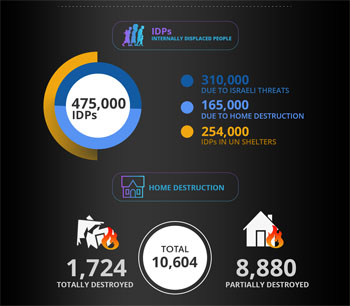Introduction
1. Established in 1968 by General Assembly resolution 2443 (XXIII), the Special Committee to Investigate Israeli Practices Affecting the Human Rights of the Palestinian People and Other Arabs of the Occupied Territories is composed of three Member States.
2. These Member States are Sri Lanka (represented by the Permanent Representative of Sri Lanka to the United Nations, H.E. Ambassador Prasad Kariyawasam, serving as Chairperson; on 1 April 2005, he replaced the former Chairman of the Committee, H.E. Ambassador Bernard A. B. Goonetilleke); Senegal (represented by the Permanent Representative of Senegal to the United Nations Office at Geneva, H.E. Ambassador Ousmane Camara); and Malaysia (represented by the Alternate Permanent Representative of Malaysia to the United Nations, H.E. Ambassador Mohd Radzi Abdul Rahman, who, as of 25 May 2005, replaced the former member of the Committee, H.E. Ambassador Rastam Mohd Isa).
3. The Special Committee reports to the Secretary-General. Its reports are reviewed in the Special Political and Decolonization Committee (Fourth Committee) of the General Assembly.
Mandate
4. The mandate of the Special Committee, as set out in resolution 2443 (XXIII) and subsequent resolutions, is to investigate Israeli practices affecting the human rights of the population of the occupied territories. For the purposes of the present report, the occupied territories are those remaining under Israeli occupation, namely the occupied Syrian Golan, the West Bank, including East Jerusalem, and the Gaza Strip. The persons covered by resolution 2443 (XXIII) and therefore the subject of the investigation of the Special Committee are the civilian population residing in the areas occupied as a result of the hostilities of June 1967 and those persons normally resident in the areas that are under occupation but who left those areas because of the hostilities.
5. The human rights of the Palestinian people and other Arabs in the occupied territories are referred to by the Security Council in its resolution 237 (1967) as “essential and inalienable human rights” and also find their legal basis in the protection afforded by international law, in particular in such circumstances as military occupation and, in the case of prisoners of war, capture. By resolution 3005 (XXVII), the General Assembly requested the Special Committee to investigate as well allegations concerning the exploitation and the looting of the resources of the occupied territories, the pillaging of its archaeological and cultural heritage and interferences in the freedom of worship in its holy places. 6. The “policies” and “practices” affecting human rights that come within the scope of investigation by the Special Committee refer, in the case of “policies”, to any course of action consciously adopted and pursued by the Government of Israel as part of its declared or undeclared intent; while “practices” refer to those actions which, irrespective of whether or not they were in implementation of a policy, reflect a pattern of behaviour on the part of the Israeli authorities towards the civilian population in the occupied areas.
7. The Special Committee bases its work on human rights standards and obligations as defined in particular by the Charter of the United Nations, the Universal Declaration of Human Rights, the International Covenant on Civil and Political Rights, the International Covenant on Economic, Social and Cultural Rights, the Geneva Convention of 12 August 1949 relative to the Treatment of Prisoners of War and the Geneva Convention of 12 August 1949 relative to the Protection of Civilian Persons in Time of War, the Hague Convention of 14 May 1954 for the Protection of Cultural Property in the Event of Armed Conflict, and the Hague Conventions of 1899 and 1907 respecting the Laws and Customs of War on Land. The Special Committee also relies on those resolutions relevant to the situation of civilians in the occupied territories adopted by the General Assembly, the Security Council, the Economic and Social Council and the Commission on Human Rights.
8. As in previous years, the General Assembly, in its resolution 59/121 requested “the Special Committee, pending complete termination of the Israeli occupation, to continue to investigate Israeli policies and practices in the Occupied Palestinian Territory, including East Jerusalem, and other Arab territories occupied by Israel since 1967, especially Israeli violations of the Geneva Convention relative to the Protection of Civilian Persons in Time of War, of 12 August 1949, and to consult, as appropriate, with the International Committee of the Red Cross according to its regulations in order to ensure that the welfare and human rights of the peoples of the occupied territories are safeguarded and to report to the Secretary-General as soon as possible and whenever the need arises thereafter”. The Assembly also requested the Special Committee “to continue to investigate the treatment of prisoners and detainees in the Occupied Palestinian Territory, including East Jerusalem, and other Arab territories occupied by Israel since 1967”.
To View the Full Report as PDF (144 KB)





